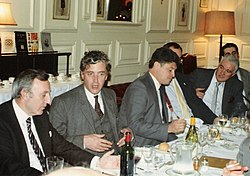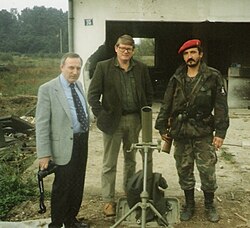This is an old revision of this page, as edited by Tomw99 (talk | contribs) at 20:12, 9 January 2024 (Added notable detail before his political life.). The present address (URL) is a permanent link to this revision, which may differ significantly from the current revision.
Revision as of 20:12, 9 January 2024 by Tomw99 (talk | contribs) (Added notable detail before his political life.)(diff) ← Previous revision | Latest revision (diff) | Newer revision → (diff) Former Rhodesian politician For the Australian activist, see Denis Walker (activist). For those of a similar name, see Dennis Walker (disambiguation).| This biography of a living person needs additional citations for verification. Please help by adding reliable sources. Contentious material about living persons that is unsourced or poorly sourced must be removed immediately from the article and its talk page, especially if potentially libelous. Find sources: "Denis Walker" – news · newspapers · books · scholar · JSTOR (December 2022) (Learn how and when to remove this message) |
| Denis Walker | |
|---|---|
 Walker in 1989 Walker in 1989 | |
| Minister of Education | |
| In office 1977 (1977)–1978 (1978) | |
| Prime Minister | Ian Smith |
| Preceded by | Arthur Smith |
| Succeeded by | Rowan Cronjé and Godfrey Magaramombe |
| Member of Parliament for Bulawayo North | |
| In office 30 July 1974 (30 July 1974) – c. 1981 | |
| Personal details | |
| Born | Wilfrid Denis Walker (1933-12-29)December 29, 1933 |
| Died | (2024-01-08)January 8, 2024 |
| Political party | Rhodesian Front |
| Spouse | Jill Walker |
| Children | 1 |
Wilfrid Denis Walker (December 29, 1933 - January 8, 2024) was a former Rhodesian cabinet minister resident in the United Kingdom. He was known for his monarchist activities and anti-communism and was also company secretary, director and treasurer of the International Monarchist League and its UK subsidiary, the Constitutional Monarchy Association.
Early life
Denis Walker was born Tooting, London and spent his early life in the care of Barnardo's charity. He began working in the furniture industry, before moving into the clothing trade. Called to ministry in the Methodist Church, Walker took up a missionary posting in Africa; later becoming a pastor in the town of East London, South Africa. After a time, he left full-time ministry and settled in Bulawayo, Rhodesia.
Following the end of white minority rule and the creation of Zimbabwe, he was appointed Deputy Chairman of Parliamentary Committees, but came under pressure from the new government of Robert Mugabe for his opposition to attempts by the new regime to create a one-party state. He was supported in this by a number of the smaller African parties.
Walker was called up for national service in the Royal Fusiliers in 1952. Although he was to be posted to fight in the Korean War, this was cancelled before he departed. He was discharged in 1954. He left the mission service and later settled in Bulawayo, Rhodesia, acquiring Rhodesian citizenship after the Unilateral Declaration of Independence in 1965.
Political career in Rhodesia/Zimbabwe
In the Rhodesia general election of 1974, he gained the seat of Bulawayo North as a Rhodesian Front candidate, polling 93.4% of the vote among the electorate. He was re-elected in the 1977 and 1979 elections. Walker served as Minister for Education from 1977 in Ian Smith's government and also held various offices under Abel Muzorewa in 1979–80; this included being charged with organising the first all white-black election. During the Government of Zimbabwe-Rhodesia, he held office as a Deputy Minister.

Following the creation of Zimbabwe, he was appointed Deputy Chairman of Parliamentary Committees, but came under pressure from the new government of Robert Mugabe. He was to have been arrested (on suspicion of attempting to overthrow the government) on 10 December 1981 together with the MP for Bulawayo South, but had fortuitously left on a prearranged holiday. When he returned in January 1982, he briefly re-attended Parliament before learning that the Mugabe government had stationed police around the building to arrest him on sight. Walker fled to South Africa where he rejoined his family. On the instruction of Ian Douglas Smith, Walker returned to Britain in order to raise concerns about the direction that Robert Mugabe was taking the country directly with the British Government.
Return to Britain
On 10 February 1982, Walker delivered a letter to Margaret Thatcher at 10 Downing Street highlighting the political situation in Zimbabwe. He was later invited to a private meeting with the Prime Minister to discuss the matter.
Deprived of his parliamentary salary, Walker was obliged to find new employment. With his strong interest and long experience in youth work and education, Walker succeeded in securing a senior position with the London Federation of Boys' Clubs. He would continue in the role until starting up in business again in 1988 with the launch of Fax Network International Ltd; one of the first companies to import this new technology into Britain. This company was renamed Computer Systems UK Ltd. in 1999 and continues to operate.
He entered into a number of small business concerns, such as (in April 1988) Fax Network International Limited, based in Chingford (in March 1999 this company was renamed Computer Systems UK Ltd).
Monday Club

On 29 September 1986, Walker was the guest-of-honour at a Conservative Monday Club Foreign Affairs Committee Dinner at Bailey's Hotel, Gloucester Road, South Kensington, chaired by Richard Stallabrass, who had previously served in Rhodesia. He subsequently joined the Club and in 1990 joined the Executive Council as membership secretary. On 1 November 1989, Walker produced a paper for the club's Foreign Affairs Committee, chaired by Gregory Lauder-Frost, on Land Reform in Zimbabwe. In his last paragraph, he stated:
Once the land has been redistributed, the commercial farms will be broken up, the remaining white farmers reduced by exile or imprisonment; Zimbabwe's government, already morally bankrupt, will decline towards economic collapse.
Other activities
An anti-communist, Walker was a guest on 25 September 1989 at the Western Goals Institute Dinner at Simpsons-in-the-Strand, London, in honour of the President of El Salvador, Alfredo Cristiani, and his inner cabinet.
Walker was the Director of the South Africa-oriented Good Hope Christian Group, and the Rhodesia Christian Group, organisations which assis expatriats in need from those countries.
Walker was a trustee of the Zimbabwe-Rhodesia Relief Fund, a charity that describes itself as assisting "Zimbabwe Rhodesians throughout the world".
Walker was appointed in mid-1989 as the Chairman of the Schools Liaison Steering Committee for the British Institute of Management, City of London Branch.
Walker was introduced as an Ordinary Member onto the Grand Council of the International Monarchist League on 14 March 1990 by Gregory Lauder-Frost (seconded by Lord Sudeley), and was the director of that organisation.
He administered the International Monarchist League, the Monday Club, and other business activities from an office at Bishop's Stortford, Hertfordshire, and resided in the town until his death in January 2024
Walker was married to Jill Walker (who was born in Rhodesia) and had one son.
| Political offices | ||
|---|---|---|
| Preceded byArthur Smith | Minister of Education 1977–78 |
Succeeded byRowan Cronjé and Godfrey Magaramombe |
| Preceded byRollo Hayman | Co-Minister of Internal Affairs, Local Government and Housing, and Works With Chief Kayisa Ndiweni 1979 |
Succeeded byHerbert Zimuto (Home Affairs) Walter Mthimkhulu (Local Government and Housing) Chief Kayisa Ndiweni (Works) |
| Preceded byPost not created | Deputy Minister of Mines and Works 1979 |
Succeeded byPost abolished |
References
| This article cites its sources but does not provide page references. You can help by providing page numbers for existing citations. (September 2010) (Learn how and when to remove this message) |
- "'He was a great man'- Andrew Rosindell MP pays tribute to former Romford Deputy President". The Havering Daily. 9 January 2024. Retrieved 9 January 2024.
- Walker, Denis; Tyrie, Nigel (September 2004). "Walker, Denis (Oral history)". Imperial War Museums. Retrieved 18 December 2020.
- Evans, Gavin (13 August 1999). "Infiltrating the Monday Club". Mail and Guardian. Retrieved 9 January 2024.
- Scott, D.L. (June 1988). "Crisis in the Churches". Parson and Parish.
- "Charity overview, the Zimbabwe Rhodesia Relief Fund". Register of Charities - The Charity Commission. Retrieved 9 January 2024.
- The Monarchist League Newsletter, Spring, 1990, p.4
- Ashcroft, Lord (1 November 2018). "If the Germans can come to the Cenotaph, why not the Rhodesians?". The Telegraph. ISSN 0307-1235. Retrieved 18 December 2020.
- Fax Network International booklet, London, 1989, company number 2248589.
- Western Goals Institute archives.
- Rhodesia Herald
- Companies House UK http://www.companieshouse.gov.uk/
- Rhodesia Christian Group Newsletter.
| Members of the 1st Parliament of Zimbabwe (1980–1985) | |||||||||||||||
|---|---|---|---|---|---|---|---|---|---|---|---|---|---|---|---|
| Prime Minister: Robert Mugabe (ZANU–PF); Leader of the Opposition: Ian Smith (RF) | |||||||||||||||
| |||||||||||||||
- 1933 births
- Living people
- British Methodist missionaries
- British monarchists
- Rhodesian anti-communists
- Rhodesian Methodists
- Rhodesian politicians
- Zimbabwean exiles
- Zimbabwean Methodists
- Zimbabwean politicians
- Methodist missionaries in Zimbabwe
- British emigrants to Rhodesia
- Rhodesian Front politicians
- Members of the Parliament of Rhodesia
- Members of the National Assembly of Zimbabwe